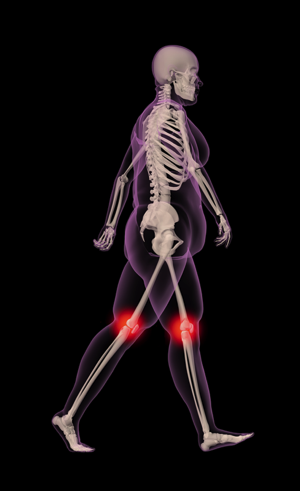
Osteoarthritis, or degenerative joint disease, is the number one cause of disability in the US, afflicting 31 million people. Until now, treatment strategies have been aimed at pain relief but not the inflammatory factors driving it.
However, new research shows that improving the gut microbiome — the community of bacteria that live in your gut — through prebiotic fiber may be the key to not only reducing the pain of osteoarthritis, but also curbing the inflammation.
Inflammation drives the arthritis of obesity
Obesity is a key risk factor for developing osteoarthritis. While it has been long been thought this is due to the extra weight overloading the joints, the new findings suggest it’s more likely linked to inflammation caused by shifts in an “obesity-prone” gut microbiome profile.
In the study, obese, arthritic mice showed less beneficial Bifidobacteria and an over abundance of inflammatory bacteria. The harmful bacteria caused inflammation throughout their bodies, leading to rapid joint deterioration.
However, when researchers fed the mice a nondigestible prebiotic fiber called oligofructose (a type of inulin), it shifted their gut microbiome to reduce inflammation protect from osteoarthritis despite no change in body weight.
This research suggests a new approach to treating osteoarthritis with a focus on gut microbiome and inflammation.
Prebiotics feed your gut bacteria
The effect of gut bacteria on arthritis pain is only one reason to improve your gut microbiome. It also helps your immune system, brain function, mood, and more. Systemic inflammation, regardless of obesity, is at the root of many chronic health disorders, including autoimmunity, heart disease, cancer, and more.
While probiotics — bacteria that line your digestive tract, support your body’s absorption of nutrients, and fight infection — have received a lot of notice in recent years, prebiotics are only now getting the press they deserve.
Prebiotics are non-digestible carbohydrates that serve as food for the bacteria (probiotics) in your gut. They come in the form of dietary fiber supplied by the fruits and vegetables you eat.
Prebiotics pass through the small intestine undigested. Once they reach the colon, gut bacteria consume them for fuel and create byproducts, such as vitamins and short chain fatty acids, valuable to human health.
Strong sources of prebiotics include all vegetables but especially:
- Garlic
- Jerusalem artichokes
- Jicama
- Dandelion greens
- Onions
- Peas
- Broccoli
- Brussels sprouts
- Fruits
- Beans
Prebiotics and probiotics together are important for battling inflammation and lowering overall disease risk.
Support plentiful SCFA for proper immune function
The short chain fatty acids (SCFAs) gut bacteria produce are essential to dampening the inflammation implicated in obesity and osteoarthritis.
One of the most important SCFAs is called butyrate. To increase butyrate and other SCFAs:
- Eat abundant and varied fruits and vegetables daily — 7 to 9 servings is recommended.
- Eat probiotic-rich fermented and cultured foods such as kimchi, sauerkraut, and coconut water kefir.
- Take SCFA-supporting supplements such as Saccharomyces boulardii, Lactobacillus sporogenes, and DDS-1 Lactobacilli acidophilus.
- Take arabinogalactan, a compound made up of protein and sugar, which is helpful for immune support and SCFA production.
Intolerance to gluten, dairy, or other foods also provokes joint pain
Joint pain can also be driven by immune reactivity to certain foods.
Two of the most common inflammatory foods are gluten and dairy — prevalent in most people’s diets. When a person with gluten sensitivity eats gluten (not just wheat, but gliadin, glutenin, and transglutaminase proteins in other grains), the immune system jumps into action, releasing pro-inflammatory signaling cells. This leads to systemic inflammation affecting the body’s organs and soft tissue, including the joints and even the brain. A similar process happens for those reactive to dairy.
Some people find vegetables in the nightshade family cause pain and inflammation in their joints. These include eggplant, potatoes (but not sweet potatoes or yams), peppers, tomatoes, tomatillos, hot pepper products (cayenne, Tabasco, etc.), and pepper-based spices. Simply removing nightshades from the diet has brought relief from joint pain for many, especially those with rheumatoid arthritis.
Gluten, dairy, and nightshades are common reactive foods, but there are more on the list. An anti-inflammatory diet is a great tool for dampening pain and inflammation while helping you determine your immune reactive foods.
Another way to find out which foods are inflammatory for you is through a food sensitivity panel.
Chronic pain can create vicious cycles both in the immune system and in the brain that perpetuate even more pain. Fortunately, through dietary measures and nutritional support, we can unwind these vicious cycles.
Ask my office for more information on alleviating your chronic joint pain by addressing the underlying cause.



Latest from the Blog
Autoimmune Disease Management with EBOO Therapy
July 17, 2024Autoimmune diseases, characterized by the immune system attacking the body’s own tissues, present significant challenges in treatment and management. Extracorporeal Blood Oxygenation and Ozonation (EBOO) therapy offers a promising adjunctive approach to managing autoimmune conditions. Functioning similarly to a dialysis machine, EBOO filters the blood to remove toxins and pathogens that may trigger autoimmune responses. […] Read more
Latest from the Blog
Detoxification and EBOO Therapy: Optimizing Cellular Health
Detoxification plays a crucial role in maintaining optimal health in today’s toxin-laden environment. Extracorporeal Blood Oxygenation and Ozonation (EBOO) therapy offers a sophisticated approach to detoxifying the bloodstream and enhancing overall well-being. Operating similarly to a blood filtration system, EBOO effectively removes toxins, pesticides, and chemicals that accumulate in the body, supporting the body’s natural […] Read more